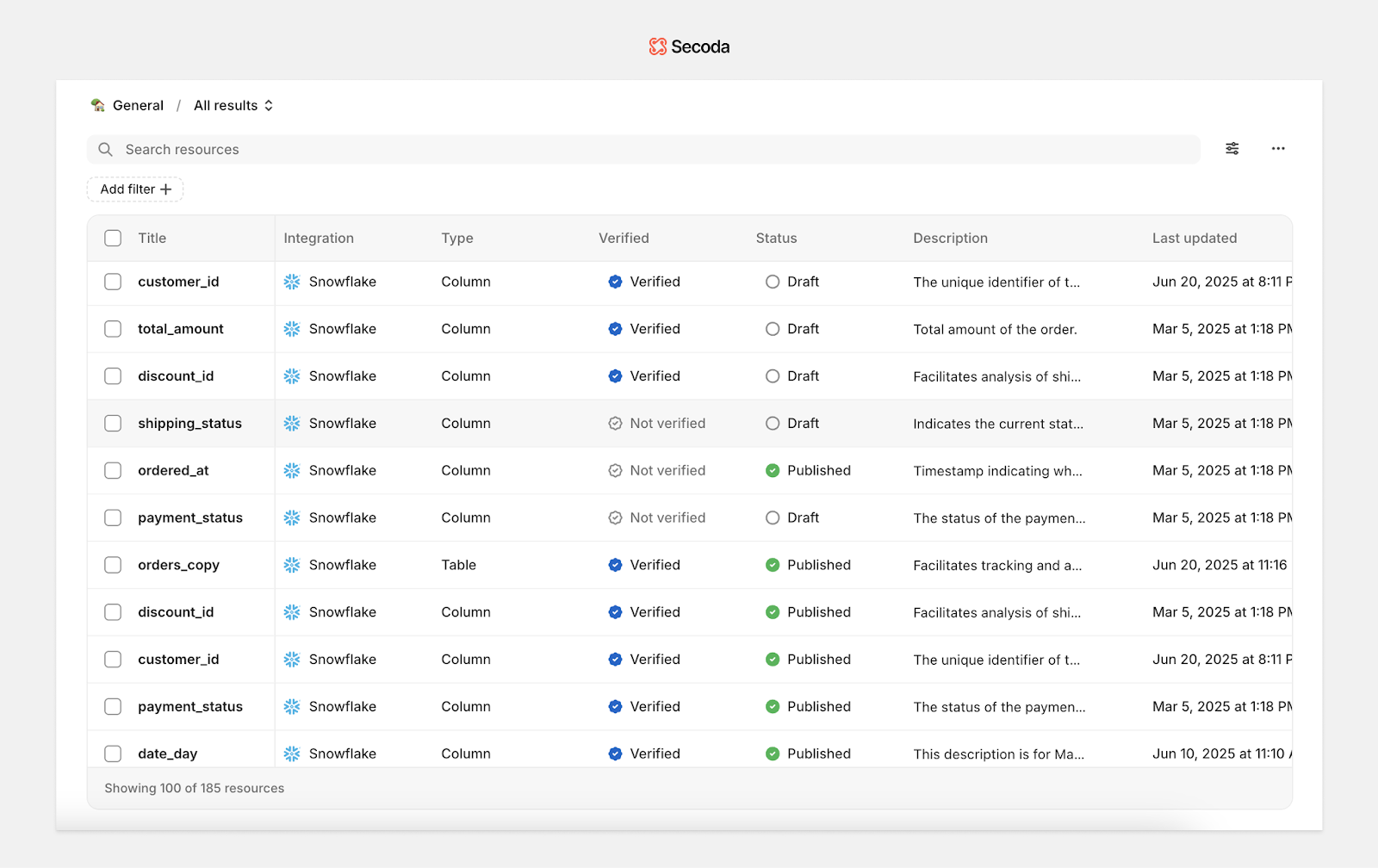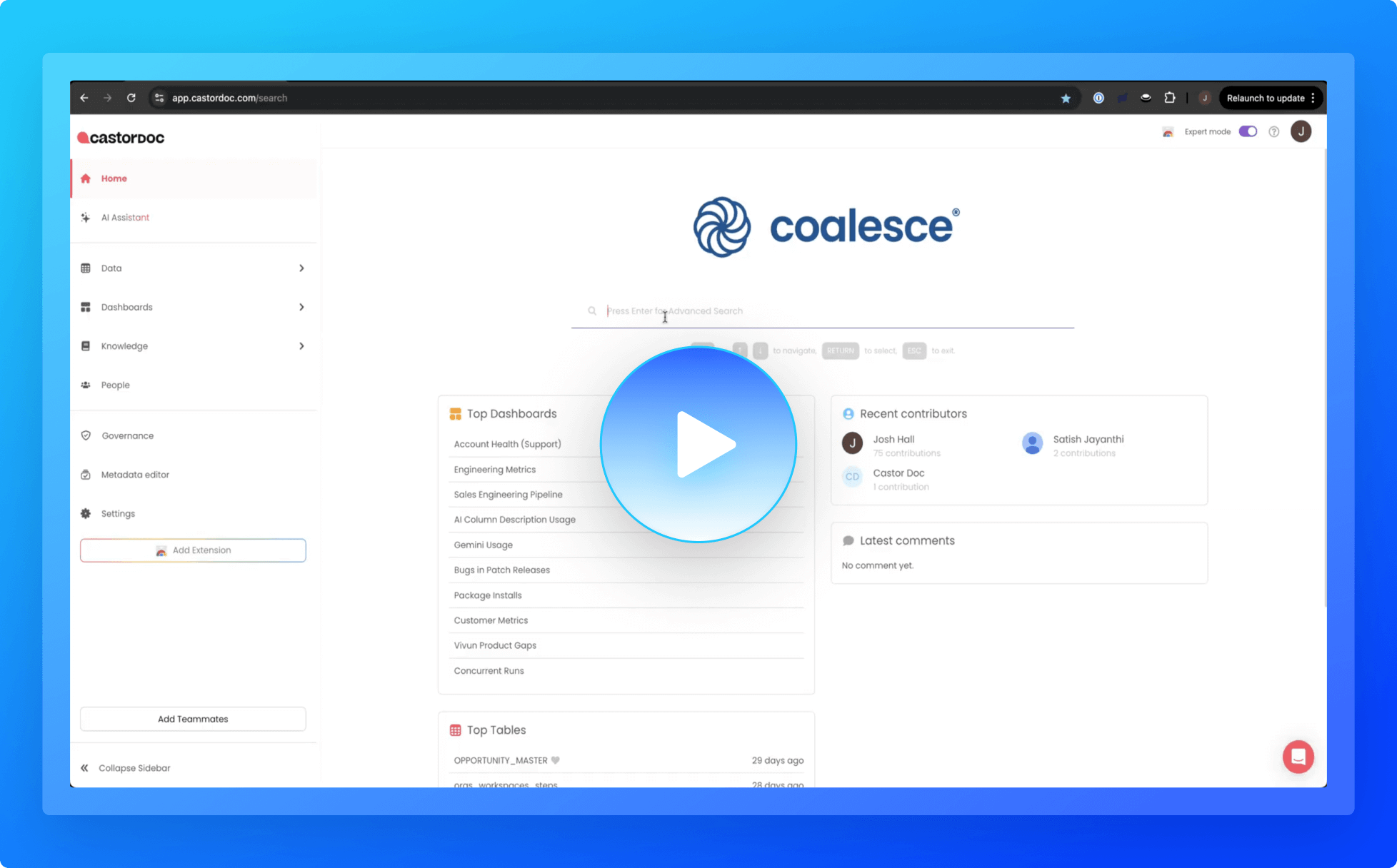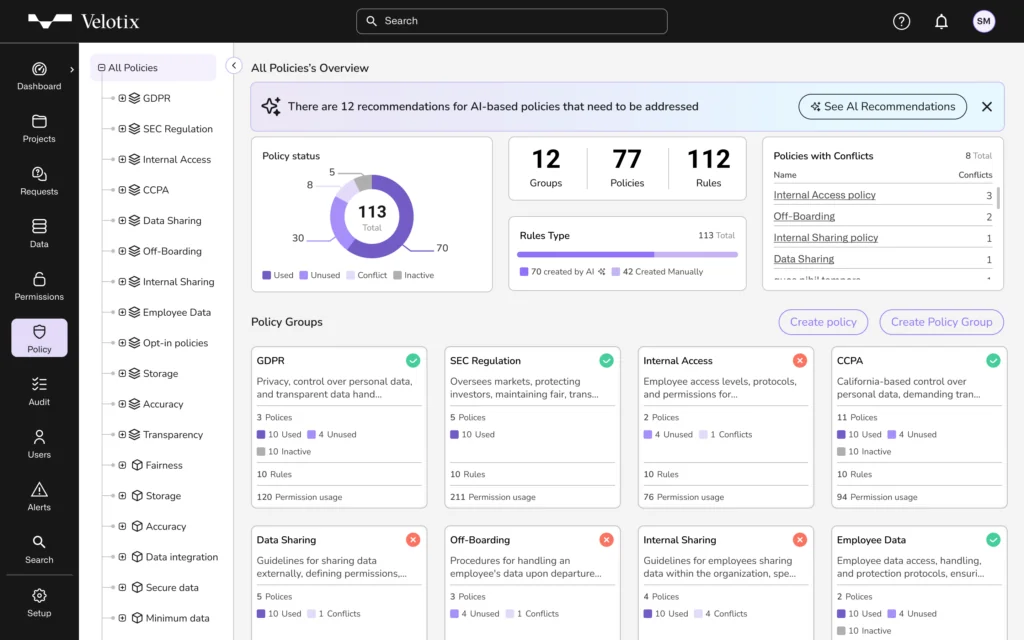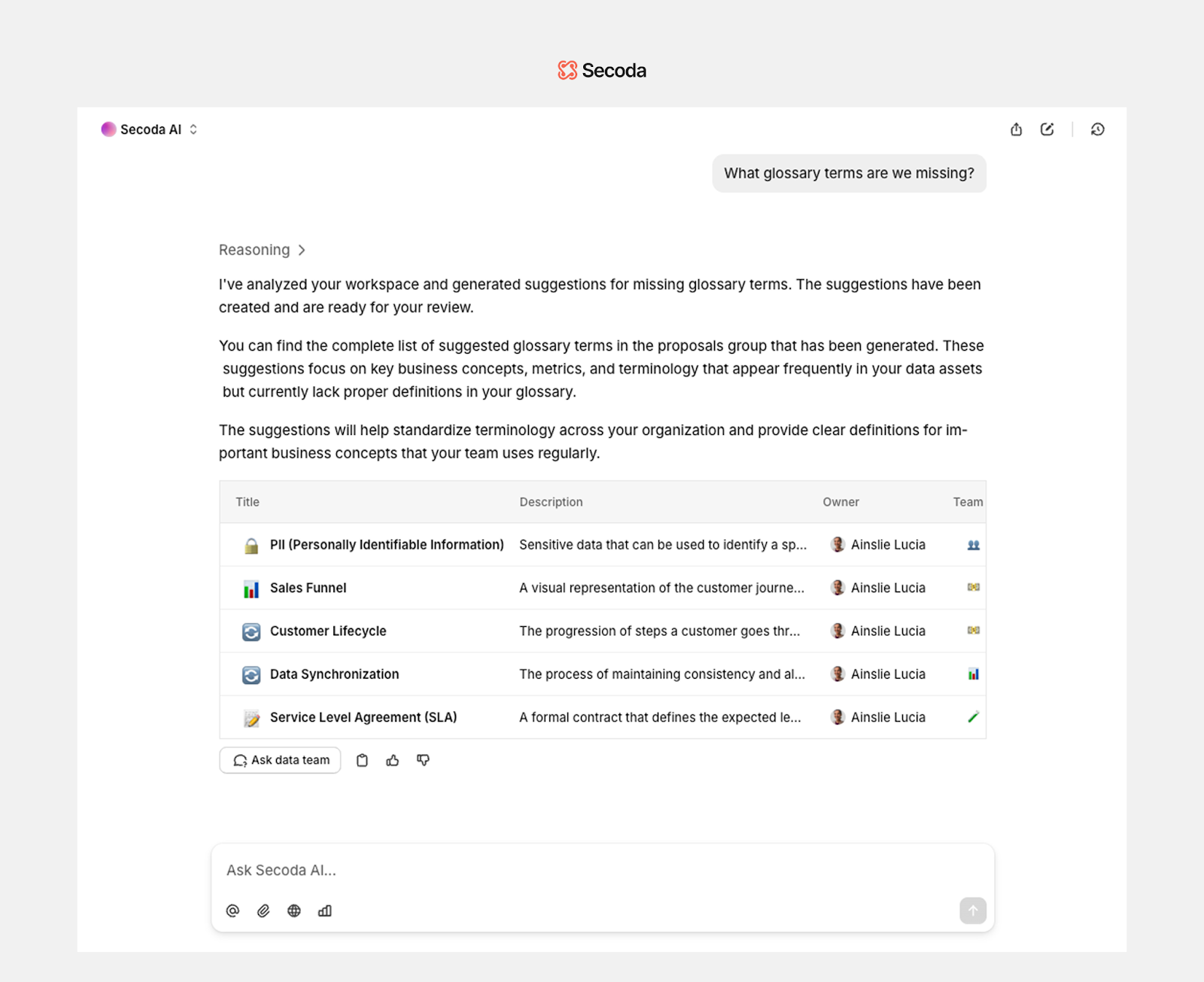In 2025, the ability to harness data effectively is more important than ever, and at the heart of this capability is the data discovery platform. As data environments grow more complex, teams now spend nearly half their time searching for the right data assets. That inefficiency has become too costly.
Modern data discovery tools are closing that gap. These platforms make it easier to locate, understand, and trust your data by replacing outdated manual processes with intuitive, AI-powered experiences. Features like automated tagging, natural language queries, and real-time lineage tracking are no longer nice to have, they are now expected.
Whether you're a data engineer, analyst, or business stakeholder, the right tool can bridge silos, improve data quality, and help your team make decisions faster and with more confidence.
In this article, we’ll compare the top data discovery tools of 2025, covering their core features, advantages, and limitations so you can choose the right platform to unlock the full value of your data.
What is a data discovery tool?
A data discovery tool is a powerful solution designed to help users efficiently locate and comprehend data across an organization’s diverse systems. Think of it as a “Google for your data” that connects to multiple data sources, organizes information automatically, and makes it searchable using intuitive interfaces and natural language processing.
But these tools go beyond basic search functionality. They provide rich context, such as metadata, data lineage, and usage insights, enabling users to understand the origins and relationships of data assets. By delivering these advanced features, modern data discovery platforms not only save time but also enhance the accuracy and trustworthiness of business insights.
How to choose the right data discovery tool for your company
Selecting the ideal data discovery tool for your organization can be a transformative decision, enabling better insights and faster decision-making. Here's a step-by-step guide to help you evaluate and choose the right solution:
1. Assess your needs
Understanding your organization's unique requirements is the foundation of selecting the right tool. Before diving into specific products, take the time to evaluate what your team truly needs:
- Data Sources: Determine which data sources the tool must connect to—cloud platforms, on-premises systems, or third-party applications.
- User Base: Understand who will use the tool. Are your primary users technical teams, like data scientists, or non-technical business analysts?
- AI Assistance: Decide the level of AI search or machine learning features you need, such as automated insights, natural language querying, or predictive analytics.
2. Compare core capabilities
Not all data discovery tools are created equal, and their features can vary widely. Carefully examine their core functionalities to ensure the tool meets your operational demands:
- Search Accuracy: Does the tool provide accurate and intuitive search capabilities?
- AI and Automation: Assess the strength of automated workflows and AI-driven functionalities, including anomaly detection, data categorization, and recommendations.
- Integration Flexibility: Verify that the tool integrates seamlessly with your existing tech stack.
- User Experience: Ensure the interface is accessible for users of varying technical expertise, from novice to advanced.
- Feature Bundling: Look for tools that offer bundled functionalities to minimize the need for additional software.
3. Consider implementation
Even the best data discovery tool will fall short if it doesn’t align with your operational realities. Consider how practical the tool is to implement and maintain in your environment:
- Setup Complexity: How easy is it to deploy the tool? Does it require significant IT involvement?
- Training Needs: Consider the learning curve for your team. Does the vendor provide adequate training resources?
- Maintenance Requirements: Understand ongoing maintenance efforts and whether updates are automatic or manual.
- Total Cost of Ownership: Account for not just the upfront cost but also licensing, support, and future scalability expenses.
Top data discovery tools comparison
Secoda
Secoda stands out as a cutting-edge data discovery and metadata management platform, purpose-built for data teams across varying levels of technical expertise. By combining AI-powered search, robust automation, and comprehensive governance features, Secoda enables organizations to streamline their data workflows and enhance collaboration.

Key features
Secoda offers a wide range of capabilities designed to empower users to discover, manage, and govern their data effectively:
Natural language search
At the heart of any effective data discovery tool is an intuitive search experience. The best tools offer natural language search that mimics a Google-like interface, allowing users to search using familiar business terms. These search functions are often enhanced with smart autocomplete and intelligent suggestions to help users find what they need faster.
AI-powered insights
Artificial intelligence is reshaping how organizations discover and interact with data. By automating analysis and enhancing context, AI-powered discovery tools reduce manual effort and uncover insights that might otherwise go unnoticed. These capabilities empower users of all skill levels to make sense of large, complex datasets with greater speed and accuracy.
- Automated metadata enrichment to improve dataset context
- Intelligent recommendations based on user behavior and patterns
- Advanced pattern recognition for quicker insight generation
Rich contextual information
Data without context can be misleading or incomplete. That’s why modern data discovery tools go beyond surface-level insights by layering in contextual information that reveals the data's lineage, usage trends, and quality. This helps users determine if the data is trustworthy, relevant, and suitable for their specific use case.
- Automatic data lineage tracking
- Usage statistics and popularity metrics
- Data quality scores and freshness indicators
This contextual information helps users evaluate the trustworthiness and utility of data assets.
Collaboration and knowledge sharing
In large organizations, data is only valuable when it’s shared and understood across teams. Data discovery tools foster collaboration by allowing users to annotate, discuss, and document insights directly within the platform. This builds a living knowledge base that grows more useful over time and supports alignment across roles and departments.
- Commenting and sharing on data assets
- Centralized knowledge bases for tribal knowledge
- Structured workflows that align with organizational processes
These features ensure collective intelligence is captured and shared across departments.
Robust integration capabilities
No tool operates in a vacuum, especially in modern data ecosystems. Comprehensive data discovery platforms offer robust integration capabilities that allow them to connect with the tools and data sources your teams already use. This interoperability ensures consistency, eliminates data silos, and streamlines analytics workflows across your stack.
- Native connectors to common databases and platforms
- API access for custom workflows and automations
- Flexible integration options to support varied tech stacks
Advantages
Secoda excels in providing a modern, user-friendly experience while delivering powerful functionality:
- Intuitive and Accessible Interface: Designed with a minimal learning curve, making it suitable for users across varying technical expertise.
- AI-Driven Productivity: Advanced AI-assisted search and documentation features streamline workflows and enhance efficiency.
- Comprehensive and Integrated Capabilities: Combines cataloging, governance, and monitoring within a single platform, seamlessly integrating with modern data stack tools and custom configurations.
- Robust Security and Scalability: Provides enterprise-grade security with SOC 2 compliance, flexible hosting options, and a scalable pricing structure to meet the needs of organizations of all sizes.
- Customer-Centric Approach: Regular updates based on user feedback, coupled with outstanding support that includes dedicated success managers for personalized assistance.
Limitations
While Secoda delivers significant value, there are a few considerations for prospective users:
- As a newer platform, it may lack the historical presence and brand recognition of legacy solutions.
- Certain advanced features are only available in higher pricing tiers.
- Custom API configurations may require technical expertise for setup.
By balancing innovative features with ease of use, Secoda positions itself as a robust choice for organizations looking to modernize their data discovery and governance processes.
Select Star
Select Star is a data discovery platform focused on delivering essential metadata management and cataloging functionalities, making it a practical choice for technical teams looking to streamline data organization and access.
Key features
Select Star provides several core capabilities:
- Centralized Metadata Management: Includes a metadata repository, data dictionary, and business glossary for standardized data organization.
- Automated Lineage and Search: Tracks data flow and dependencies while enabling intuitive, AI-powered search functionality.
- No-Code Integration and Browser Access: Simplifies connections to data sources and offers Chrome extension access for convenience.
Advantages
Select Star offers distinct benefits:
- User-Friendly for Technical Teams: Provides a straightforward interface and role-based permissions for seamless use.
- Flexible Hosting Options: Supports on-premise deployments for organizations with specific compliance needs.
- Strong Customer Support: Highly rated for responsive and personalized assistance.
Limitations
While useful for metadata management, Select Star has notable limitations:
- Basic Observability and Governance: Lacks data quality scoring, security tagging, and advanced governance features.
- Scalability and Setup Challenges: Limited scalability for growing teams, with a more complex and manual implementation process.
Select Star suits technical teams seeking foundational data discovery capabilities but may not meet the demands of organizations requiring AI functionality, usability for non-technical users, or scalability.

Alation
Alation is a widely recognized legacy data catalog platform that integrates data discovery with comprehensive governance capabilities. It is a favored choice for enterprises seeking to enhance data management and compliance across large-scale organizations.
Key features
Alation delivers a robust set of functionalities to support enterprise data governance and collaboration:
- AI-Driven Categorization and Insights: Features machine learning-based categorization and automated data profiling to enhance metadata management.
- Enhanced Querying and Collaboration: Includes smart query suggestions, a business glossary, and workflows designed to improve team collaboration.
- Governance and Stewardship Tools: Offers a policy management system and data stewardship framework for robust compliance and data governance.
Advantages
Alation stands out with several key strengths:
- Enterprise-Grade Governance: Offers strong capabilities for managing policies, metadata, and compliance.
- Scalability and Security: Well-suited for large enterprises with robust security features and flexible integration options.
- Community and Analytics Support: Benefits from an active user community and detailed usage analytics for better decision-making.
Limitations
Despite its capabilities, Alation has some drawbacks:
- Complexity for Business Users: Its interface may be challenging for non-technical users to navigate effectively.
- Limited Visualization and AI Capabilities: Visualization tools and AI/ML functionality are less advanced compared to modern alternatives.
- High Ownership Costs and Implementation Challenges: Features a lengthy implementation process, high total cost of ownership, and complex customization requirements.
- Architecture Limitations: A closed system architecture restricts flexibility for advanced use cases.
Alation is an excellent choice for enterprises prioritizing governance and scalability. However, organizations seeking user-friendly interfaces, advanced visualizations, or open architecture may need to evaluate alternative solutions.

Atlan
Atlan is a modern data discovery platform designed with a strong emphasis on collaboration and metadata management. Its intuitive interface and streamlined workflows make it a versatile tool for teams looking to enhance data accessibility and teamwork.
Key features
Atlan provides several innovative features to support collaborative data discovery:
- Intuitive Search Interface: Google-like search with synonym support simplifies finding and understanding data assets.
- Automated Metadata Management: Features automated metadata ingestion for efficient organization and updates.
- Collaboration and Accessibility: Includes workflows for teamwork and a browser extension for easy data access.
- Custom Classification Framework: Allows users to tailor classifications to meet specific organizational needs.
Advantages
Atlan excels in several areas:
- User-Friendly Design: Features a clean interface complemented by comprehensive documentation for easy onboarding.
- Strong Metadata Management: Provides robust tools for organizing and governing metadata effectively.
- Community and Workflow Support: Benefits from an active user community and advanced deprecation workflows for data lifecycle management.
Limitations
While Atlan offers significant benefits, it has some drawbacks:
- Limited Advanced Features: Lacks integrated AI chatbot functionality, extensive automation, and advanced analytics capabilities.
- Pricing and Learning Curve: Premium pricing tiers and a significant initial learning curve may deter smaller or less technical teams.
- Integration and Data Quality Gaps: Custom integrations can be complex, and built-in data quality features are limited.
Atlan is a strong choice for organizations prioritizing collaboration and metadata management. However, teams needing extensive automation, advanced analytics, or integrated AI features may require alternative solutions.

Collibra
Collibra offers data discovery within the context of its broader enterprise data governance platform. With a focus on compliance, policy management, and metadata governance, Collibra provides a comprehensive solution for organizations seeking to enhance data stewardship and governance at scale.
Key features
Collibra delivers a range of features tailored to data governance and management:
- Centralized Business Glossary: Helps standardize terminology across the organization.
- Policy and Compliance Management: Includes a policy management framework and compliance monitoring tools to ensure regulatory adherence.
- Reference Data and Lineage Tracking: Provides tools for managing reference data and tracking data lineage for impact analysis.
- Access Control and Workflow Automation: Allows for fine-grained access control and the automation of workflows to streamline data governance processes.
- Comprehensive Metadata Management: Centralizes metadata management for easier access and organization.
Advantages
Collibra stands out in several key areas:
- Enterprise-Grade Governance: Offers a robust governance framework with strong policy and compliance management capabilities.
- Security and Customization: Provides enterprise-level security and extensive options for customizing workflows to meet business needs.
- Active Community and Metadata Support: Benefits from an engaged user community and solid metadata management features.
Limitations
Despite its strengths, Collibra has certain limitations:
- Complex Setup and Maintenance: The initial setup process is resource-intensive, and ongoing maintenance can be demanding.
- Limited AI and Data Visualization: Lacks advanced AI features like chatbot assistance and automated documentation, as well as robust data visualization tools.
- Pricing and Usability: Features a premium pricing structure, and the user interface may be complex for some users, especially non-technical teams.
Collibra is ideal for large enterprises with complex data governance needs, but smaller teams or those seeking advanced AI, data visualization, and more accessible usability may need to explore alternatives.

Looker
Looker, primarily known as a business intelligence (BI) tool, offers robust data discovery capabilities through its powerful analytics and visualization features. It allows teams to explore, analyze, and visualize data within a unified platform, with advanced modeling and integration options.
Key features
Looker provides a variety of features to enable data discovery and analytics:
- Real-Time Reporting and Dashboards: Interactive, up-to-the-minute reporting and data visualization capabilities.
- LookML Modeling Language: Allows users to define data models and relationships in a customizable way.
- Version Control and Git Integration: Facilitates version control and seamless integration with Git for collaborative development.
- Scheduled Alerts and Data Delivery: Enables automated data delivery and alerting based on user-defined schedules.
- Row-Level Security and Access Controls: Provides granular access controls and security features at the row level.
Advantages
Looker offers significant advantages for organizations, especially those in need of scalable BI solutions:
- Google Cloud Integration: Deep integration with the Google Cloud Platform streamlines data workflows and enhances cloud-based operations.
- Advanced Visualization Capabilities: Offers powerful, customizable visualization options to suit a variety of business needs.
- Comprehensive Support: Backed by extensive documentation and an active user community.
- Scalability: Provides enterprise-grade scalability, making it well-suited for large organizations.
Limitations
Despite its powerful features, Looker has a few drawbacks:
- Learning Curve: LookML adoption requires significant effort and may pose a challenge for non-technical users.
- Complex Interface: The interface can be overwhelming for users without a technical background.
- Cost: Full access to all features comes at a higher price point, making it less accessible for smaller teams.
- Google Cloud Dependency: Functionality is limited outside the Google Cloud ecosystem, reducing flexibility for non-Google Cloud users.
Looker is a powerful data discovery tool for organizations already leveraging Google Cloud and those that require robust BI features. However, its learning curve, complexity, and pricing may make it less ideal for smaller or less technical teams.

Metaphor
Metaphor is a straightforward data catalog tool that focuses on metadata management and basic data discovery capabilities. It is designed for technical teams looking for a simple solution to organize and discover their data without complex configurations or advanced features.
Key features
Metaphor offers essential features for metadata management and data discovery:
- Metadata Repository and Catalog: Centralizes metadata storage for easy access and management.
- Data Dictionary and Business Glossary: Provides standardized terminology to improve data understanding across the organization.
- AI-Powered Search and Documentation: Uses AI to enhance search and documentation capabilities for efficient data discovery.
- Automated Lineage Tracking: Offers automated table and column lineage tracking to visualize data flow.
- No-Code Setup: Simplifies the setup process with a no-code installation for easy deployment.
Advantages
Metaphor brings several notable advantages to technical teams:
- Efficient Lineage Automation: Automates table and column lineage tracking for streamlined data governance.
- Strong Metadata Management: Offers robust tools for organizing and managing metadata effectively.
- Built-in PII Scanning: Ensures compliance with privacy regulations by scanning for PII.
- Browser-Based Accessibility: Allows easy access through a web-based interface.
Limitations
While Metaphor is effective for basic data discovery, it does have several limitations:
- Limited Automation and AI Features: Lacks advanced automation tools and an AI-powered chatbot for interactive assistance.
- No Data Quality Monitoring: Does not include built-in data quality tracking or monitoring features.
- Basic Reporting Capabilities: Offers minimal reporting functionality, limiting insights into data usage and trends.
- Absence of Data Request Portal: Does not provide a centralized portal for data requests or collaboration.
Metaphor is a solid choice for technical teams needing a simple, no-fuss data catalog and metadata management tool. However, its lack of advanced features and focus on technical users may make it less suitable for organizations seeking more comprehensive capabilities or a broader user base.

data.world
Data.world is a data catalog platform that provides basic metadata management and collaboration features.
Key features
- Data dictionary and business glossary
- Metadata repository and catalog system
- Standard metadata sharing tools
- Basic AI documentation features
- API access and Chrome extension
- Role-based access controls
- On-premise hosting option
- Automated lineage tracking
- Integration with modern data tools
Advantages
- Established metadata management system
- Broad range of native integrations
- Basic automation capabilities
- Standard data lineage tracking
- Customizable deployment options
- API accessibility
Limitations
- No AI chatbot functionality and other AI-powered features
- No data observability or monitoring capabilities
- Basic governance framework
- Absence of data quality scoring
- Limited business user accessibility

Coalesce Catalog
Launched in 2023 following Coalesce’s acquisition of CastorDoc, Coalesce Catalog brings AI‑driven metadata discovery directly into the transformation workflow.
Key features
- Embedded catalog: Seamlessly integrated into Coalesce, the catalog captures metadata, documentation, and lineage as your data pipelines evolve
- Column‑level lineage: Automatically tracks lineage from source to BI tools at a granular level, enabling impact analysis and compliance.
- AI‑powered discoverability: Supports natural‑language search and an AI assistant that guides both technical and non‑technical users to relevant data assets across tables, metrics, dashboards, and more.
- Governance: Embedded via role‑based access controls, audit trails, automated classification, and dynamic metadata.
Limitations
- Tied to Coalesce platform: This tight integration means users must operate within Coalesce to access catalog features.
- Relatively new offering: As a more recent entrant, it may have fewer legacy community extensions compared to long‑standing catalog tools.

Velotix
Velotix is an AI-driven data access governance platform that combines automated policy enforcement with intelligent data discovery. Designed for highly regulated industries, it ensures sensitive data is accessed securely while empowering teams to discover and use data responsibly. (velotix.ai)
Key features
- Automated access controls: Dynamically grants or restricts access based on user roles, data sensitivity, and regulatory requirements.
- AI-powered discovery: Uses machine learning to classify data, detect policy violations, and surface relevant assets without manual tagging.
- Built-in compliance: Supports GDPR, HIPAA, and other data privacy regulations through centralized policy management and audit logs.
- Self-service data requests: Business users can request access through a guided interface, reducing back-and-forth with IT.
Limitations
- Governance-centric: While powerful for access control and compliance, Velotix focuses less on broader cataloging, lineage, or collaboration features.
- Requires governance maturity: Best suited for teams that already have clearly defined policies and need to enforce them at scale.

Platform‑native catalogs
These are data platform–integrated catalogs, which work well when you're already embedded in that particular data stack:
- Snowflake Horizon / Open Catalog
- Databricks Unity Catalog
- AWS Glue Data Catalog
- Google Cloud Dataplex Universal Catalog
- Microsoft Purview
- Oracle Enterprise Metadata Management
A key limitation of platform-native catalogs is that they’re only accessible if you're already using that specific tool. Because these catalogs weren’t originally designed as standalone discovery platforms, they often lack broader capabilities like cross-source search, advanced automation, or collaboration features found in dedicated data catalog solutions.
Open‑source tools
Flexible, extensible catalogs:
- Amundsen (Lyft): ingestion, search, lineage, visualization
- Apache Atlas
- DataHub
- Marquez
- OpenMetadata
- OpenDataDiscovery
Open-source data catalogs offer flexibility and extensibility, but they require significant engineering effort to set up, maintain, and scale. These tools often lack out-of-the-box polish, meaning teams need to build connectors, manage infrastructure, and handle updates themselves, making them better suited for organizations with strong in-house data engineering resources.
Key features of a comprehensive data discovery tool
A comprehensive data discovery tool offers several essential features that enhance data accessibility and usability. The foundation lies in its natural language search capabilities, providing users with a familiar Google-like search experience. This includes the ability to understand business terms and incorporating smart autocomplete and suggestions to streamline the search process.
The tool leverages AI-powered insights to enhance data understanding and analysis. Through automated metadata enrichment, intelligent recommendations, and sophisticated pattern recognition, users can quickly derive meaningful insights from their data assets.
Context is crucial in data discovery, which is why these tools incorporate robust contextual features. They automatically track data lineage, maintain usage statistics and popularity metrics, and provide quality metrics along with freshness indicators. This contextual information helps users understand the data's origin, reliability, and relevance to their needs.
Effective collaboration is enabled through comprehensive features that promote team interaction and knowledge sharing. Users can comment on and share data assets, contribute to collective knowledge bases, and participate in structured team workflows. These capabilities ensure that insights and understanding can be effectively distributed throughout the organization.
The tool's value is further enhanced by its integration capabilities. It typically includes native connectors to common data sources, providing API accessibility, and offering custom integration options. This flexibility ensures that the tool can adapt to various technological environments and data ecosystems while maintaining seamless functionality across different platforms and systems.

Why choose Secoda for data discovery?
As organizations face increasing challenges with data accessibility and understanding, the right data discovery tool becomes crucial. Secoda stands out as the most comprehensive and user-friendly solution for modern data teams.
Here's why organizations trust Secoda for their data discovery needs:
1. Superior search experience
- AI-powered search understands natural language and business context
- Faster time-to-insight with instant, relevant results
- No technical expertise required to find and understand data
2. Complete data context
- Automated metadata collection provides rich context for every data asset
- Real-time lineage tracking shows data relationships and dependencies
- Usage analytics help identify most valuable data assets
3. Modern, all-in-one platform
- Combines discovery, catalog, monitoring and governance in one intuitive interface
- No need to maintain multiple tools or platforms
- Seamless integration with your existing data stack
4. Built for scale
- Grows with your organization's data needs
- Enterprise-grade security with SOC 2 compliance
- Automated processes reduce manual maintenance
5. Proven ROI
- Reduces time spent documenting data by 100%
- Increases data team productivity through self-service
- Strengthens data governance while enabling faster access

Choosing the right data discovery tool in 2025
The data discovery platforms shaping 2025 all share one goal: helping organizations find, understand, and trust their data quickly. Whether you’re prioritizing AI-powered search, built-in governance, or real-time lineage, the right solution will reduce friction and increase confidence across your data workflows.
For teams that want advanced capabilities without sacrificing usability, Secoda brings together the best of search, automation, and governance in one centralized platform. With built-in AI, flexible integrations, and an intuitive interface, Secoda empowers every user, technical or not, to uncover insights and drive better decisions.
Try Secoda today and see how it transforms your approach to data discovery and management.
👉 Get Started with Secoda






.png)
.png)








